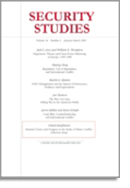The Spread of Military Innovations: Adoption Capacity Theory, Tactical Incentives, and the Case of Suicide Terrorism

Autor(en): Andrea Gilli, Mauro Gilli
Journaltitel: Security Studies
Band: 23
Ausgabe: 3
Seiten: 513-547
Publikationsjahr: 2014
